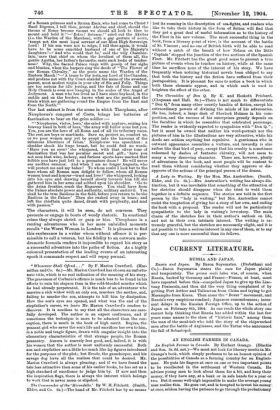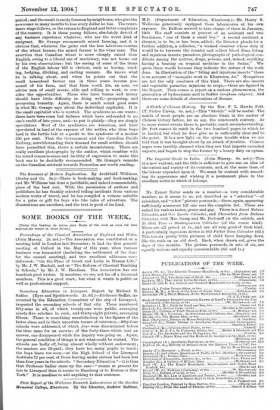An English Farmer in Canada. By Herbert Grangs. (Blackie and
Son. 3s. 6d. net.)—We must not look for literary merits in Mr. Grange's book, which simply professes to be an honest opinion of the possibilities of Canada as a farming country for an English- man. He puts his fingers at once on one or two important points to be recollected in the settlement of Western Canada. He advises young men to look about them for a bit, and keep their money, if they have any, at a bank or in safe hands for a year or. two. But it seems well-nigh impossible to make the average young man realise this. He goes out, and is tempted to invest his money at once, seldom having the patience to go through the probationary period ; and the result is easily foreseen by neighbours, who give the newcomer so many months to lose every dollar he has. The remit- tance stage follows, or the return to England and bitter complaints of the country. It is these young fellows, absolutely devoid of any business experience whatever, who are the worst kind of emigrant. Mr. Grange recommends mixed farming, and it is obvious that, whatever the gains and the less laborious routine of the wheat farmer, the mixed farmer is the wiser man. The assertion that Canadian wheat is more cheaply raised than English, owing to a liberal use of machinery, was not borne out by his own observations ; but the saving of some of the items of the English labour bill is obvious, such as hoeing, weed- ing, hedging, ditching, and carting manure. He knows what he is talking about, and when he points out that the small homestead farmer can in three years become pos- sessed of his farm, and that farm worth 20s. an acre, we advise men of small means, able and willing to work, to con- sider the opportunities. Those who have brains and money should have little difficulty in doing well,—prospering, and prospering honestly. Again, there is much sound good sense in what Mr. Grange says about the individual capitalist. It is the small capitalist who is wanted. The syndicate no one wants ; there have been some bad failures which have redounded to no one's credit of late years, and—to put it plainly—they are simply speculators. Most of the syndicates are American, and have speculated in land at the expense of the settler, who thus buys land in the fertile belt at a profit to the syndicate of a modest 250 per cent. That the Government and the Canadian Pacific Railway, notwithstanding their demand for small settlers, should have permitted this, shows a certain inconsistency. There are really excellent photographs by the author, which combine with his sound common-sense and lucidity of expression to make this book one to be decidedly recommended. Mr. Grange's remarks on the Canadian attitude towards Protection are worth reading.











































 Previous page
Previous page